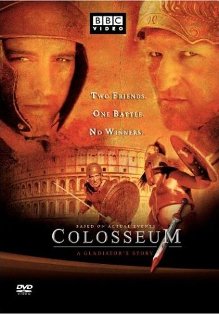
A gladiator was an armed combatant who entertained audiences in the Roman Republic and Roman Empire in violent confrontations with other gladiators, wild animals, and condemned criminals. Some gladiators were volunteers who risked their lives and their legal and social standing by appearing in the arena. Most were despised as slaves, schooled under harsh conditions, socially marginalized, and segregated even in death.
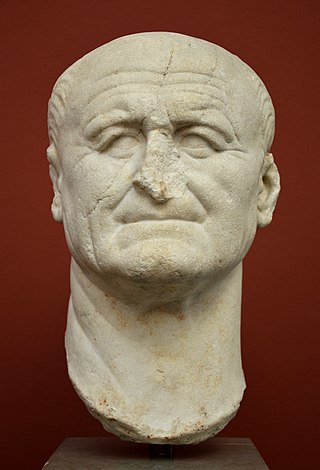
Vespasian was Roman emperor from 69 to 79. The last emperor to reign in the Year of the Four Emperors, he founded the Flavian dynasty, which ruled the Empire for 27 years. His fiscal reforms and consolidation of the empire brought political stability and a vast building program.

Commodus was a Roman emperor who ruled from 177 until his assassination in 192. For the first three years of his reign he was co-emperor with his father Marcus Aurelius. Commodus' sole rule, starting with the death of Marcus in 180, is commonly thought to mark the end of a golden age of peace and prosperity in the history of the Roman Empire.

The Colosseum is an elliptical amphitheatre in the centre of the city of Rome, Italy, just east of the Roman Forum. It is the largest ancient amphitheatre ever built, and is still the largest standing amphitheatre in the world, despite its age. Construction began under the Emperor Vespasian in 72 and was completed in AD 80 under his successor and heir, Titus. Further modifications were made during the reign of Domitian. The three emperors who were patrons of the work are known as the Flavian dynasty, and the amphitheatre was named the Flavian Amphitheatre by later classicists and archaeologists for its association with their family name (Flavius).

Titus Caesar Vespasianus was Roman emperor from 79 to 81. A member of the Flavian dynasty, Titus succeeded his father Vespasian upon his death, becoming the first Roman emperor to succeed his biological father.
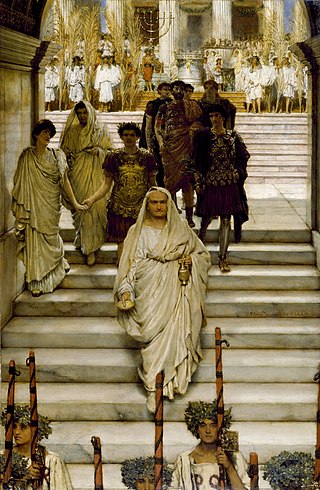
The Flavian dynasty, lasting from AD 69 to 96, was the second dynastic line of emperors to rule the Roman Empire following the Julio-Claudians, encompassing the reigns of Vespasian and his two sons, Titus and Domitian. The Flavians rose to power during the civil war of AD 69, known as the Year of the Four Emperors; after Galba and Otho died in quick succession, Vitellius became emperor in mid 69. His claim to the throne was quickly challenged by legions stationed in the eastern provinces, who declared their commander Vespasian emperor in his place. The Second Battle of Bedriacum tilted the balance decisively in favor of the Flavian forces, who entered Rome on 20 December, and the following day, the Roman Senate officially declared Vespasian emperor, thus commencing the Flavian dynasty. Although the dynasty proved to be short-lived, several significant historic, economic and military events took place during their reign.
Verus was a well-known gladiator during the reigns of the Emperors Vespasian and Titus in the later part of the 1st century. His combat with Priscus was the highlight of the opening day of the games conducted by Titus to inaugurate the Flavian Amphitheatre in AD 80, and recorded in a laudatory poem by Martial — the only detailed description of a gladiatorial fight that has survived to the present day. Both gladiators were declared victors of the combat, and were awarded their freedom by the Emperor in a unique outcome.
Priscus was a Roman gladiator of Celtic origins. His combat with Verus was the highlighted entertainment of the opening day games sponsored by Titus to inaugurate the Flavian Amphitheatre in AD 80. It was recorded in a laudatory poem by Martial — Liber Spectaculorum is the only known detailed description to survive of a gladiatorial fight. This laudatory poem was written to honor and to highlight all the events of Titus's games. Their fight marked the beginning of the celebration and concluded in a rare result. Both gladiators were declared victors of the match, and were unexpectedly awarded their freedom by the Emperor.

Gladiator is a 2000 historical epic film directed by Ridley Scott and written by David Franzoni, John Logan, and William Nicholson from a story by Franzoni. It stars Russell Crowe, Joaquin Phoenix, Connie Nielsen, Oliver Reed, Derek Jacobi, Djimon Hounsou, and Richard Harris. Crowe portrays the Roman general Maximus Decimus Meridius, who is betrayed when Commodus, the ambitious son of Emperor Marcus Aurelius, murders his father and seizes the throne. Reduced to slavery, Maximus becomes a gladiator and rises through the ranks of the arena, determined to avenge the murders of his family and the emperor.
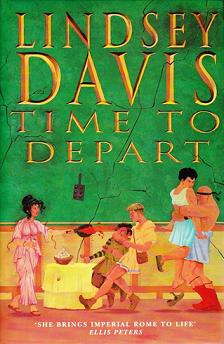
Time to Depart is a 1995 historical mystery crime novel by Lindsey Davis and the seventh book of the Marcus Didius Falco Mysteries series. Set in Rome during AD 72, the novel stars Marcus Didius Falco, an informer and imperial agent. The title refers to the law which stated that no Roman citizen who had been sentenced to death might be arrested, even after the verdict, until he has been given time to depart, the idea being that for a Roman citizen to choose exile outside the boundaries of the Empire would have been a fate worse than death itself.
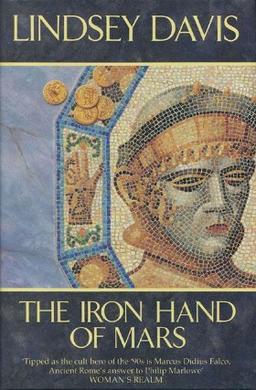
The Iron Hand of Mars is a 1992 historical mystery crime novel by Lindsey Davis and the fourth book of the Marcus Didius Falco Mysteries series. Set in Rome and Germania during AD 71, the novel stars Marcus Didius Falco, informer and imperial agent. The iron in the title refers to the standard, shaped like a giant hand made of iron, which Falco is required to deliver to the imperial legions in Germany.

The Ludus Magnus, also known as the Great Gladiatorial Training School, was the largest of the gladiatorial schools in Rome. It was built by the emperor Domitian in the late first century C.E., alongside other building projects undertaken by him such as three other gladiatorial schools across the Roman Empire.

Venus in Copper is a 1991 historical mystery crime novel by Lindsey Davis and the third book of the Marcus Didius Falco Mysteries series. Set in Rome during AD 71, just after the year of the four emperors, the novel stars Marcus Didius Falco, informer and imperial agent. The copper of the title refers to a simple copper signet ring featuring a portrait of Venus, worn by the suspect Severina Zotica. That Venus was the goddess of love hints at the motives for some of the murders perpetrated by the suspect: revenge out of unrequited love.
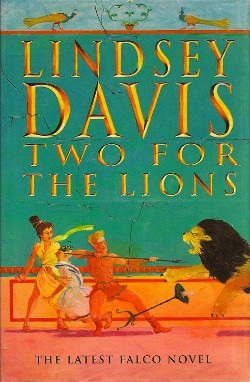
Two for the Lions is a 1998 historical mystery crime novel by Lindsey Davis and the 10th book of the Marcus Didius Falco Mysteries series. Set in Rome and Tripolitania between December AD 73 and May AD 74, during the reign of Emperor Vespasian, the novel stars Marcus Didius Falco, informer and imperial agent. The title refers to the execution of criminals in the arena, by trained lions.

Saturnalia is a 2007 historical mystery crime novel by Lindsey Davis and the 18th book of the Marcus Didius Falco Mysteries series. Set in Ancient Rome, the novel's central character and narrator is Marcus Didius Falco, informer and imperial agent. The title refers to the Saturnalia feast held annually on 17 December, at which the Romans commemorated the dedication of the temple of the god Saturn. Over the years, it expanded to a whole week, up to 23 December.

The inaugural games were held, on the orders of the Roman Emperor Titus, to celebrate the completion in AD 80 of the Colosseum, then known as the Flavian Amphitheatre.

The Amphitheatre of Statilius Taurus was a Roman amphitheatre in ancient Rome. The amphitheatre was inaugurated in 29 BC. Earlier arenas were temporary structures that were disassembled after the event. The amphitheatre was built by Titus Statilius Taurus, who paid for it from his own resources. Statilius Taurus was a successful general and politician in the time of emperor Augustus and had gathered much wealth during his career. For the inauguration he also paid for the gladiatorial games.

Roman amphitheatres are theatres — large, circular or oval open-air venues with tiered seating — built by the ancient Romans. They were used for events such as gladiator combats, venationes and executions. About 230 Roman amphitheatres have been found across the area of the Roman Empire. Early amphitheatres date from the Republican period, though they became more monumental during the Imperial era.
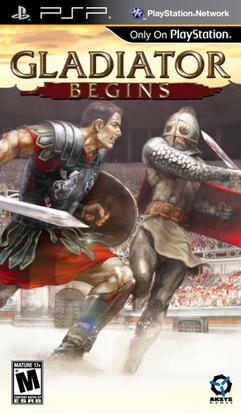
Gladiator Begins is a fighting game developed by Japanese studio GOSHOW and published in Japan by Acquire on January 14, 2010, and in North America by Aksys Games on September 14. It is the prequel to the 2005 video game Colosseum: Road to Freedom, which was originally released for the PlayStation 2.
